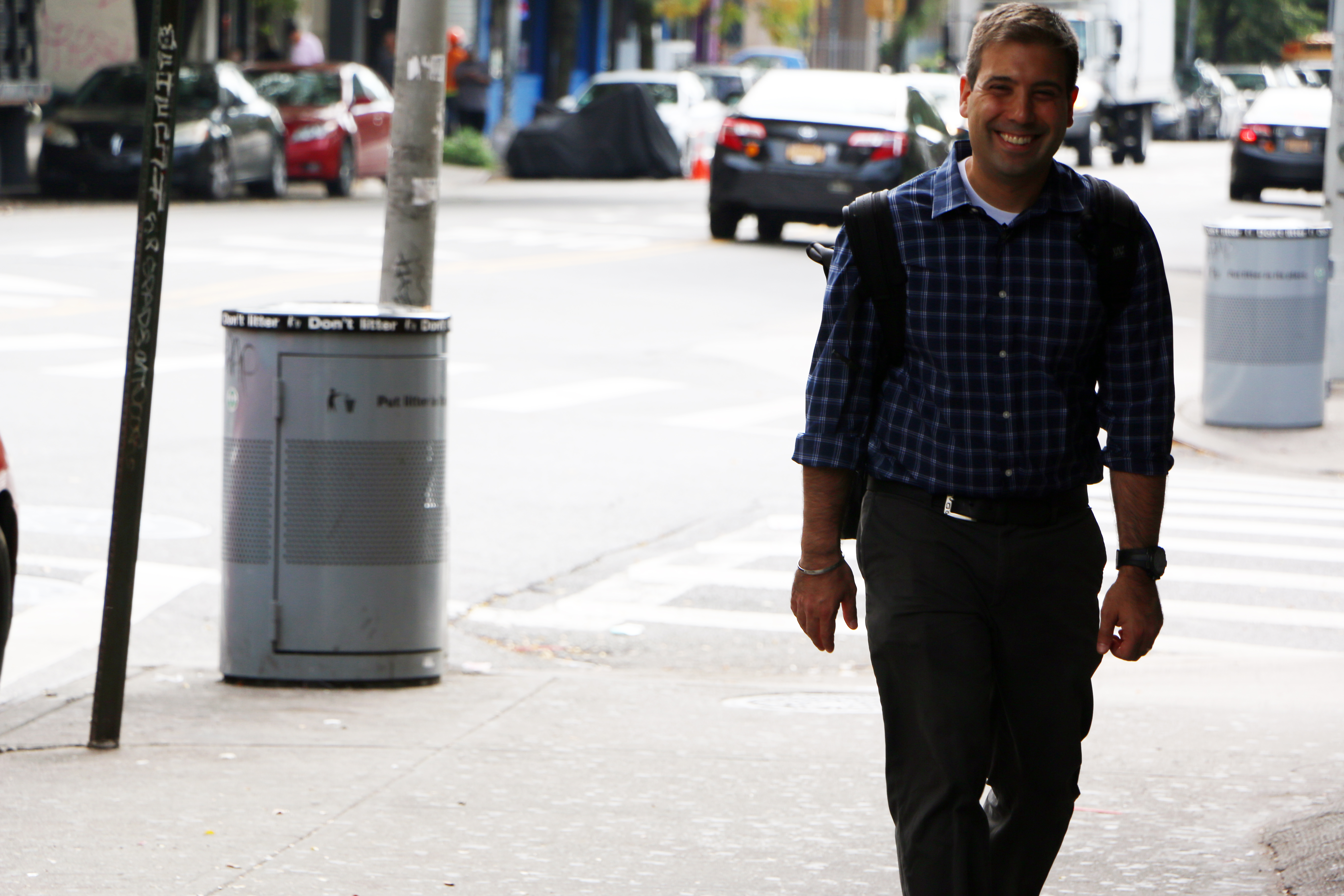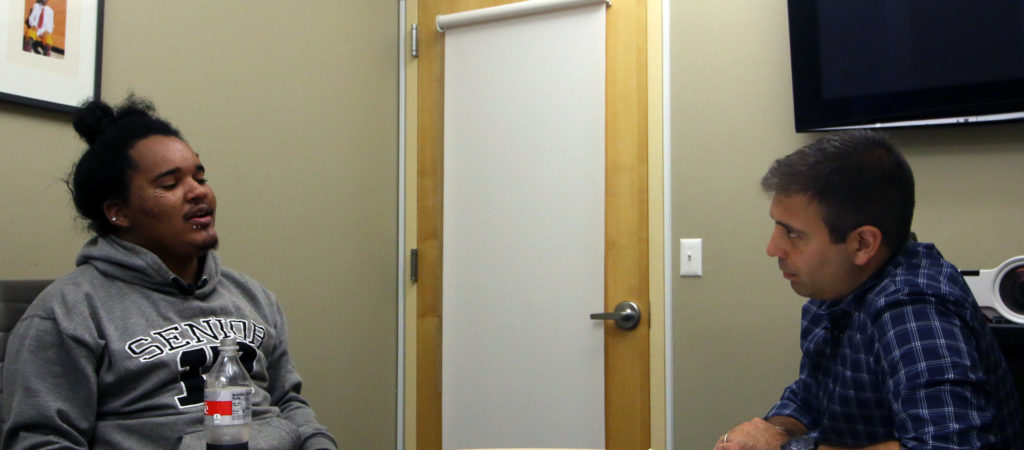Blog

Helping People Where They Are At: An Interview with Director of Psychiatry Tony Carino
May 29, 2019May is Mental Health Awareness Month, a cause that is integral to the work that we do here at CUCS. The National Alliance on Mental Illness reports that 1 in 5 adults in the U.S. experience mental illness in a given year. Meanwhile, the Substance Abuse and Mental Health Services Administration reports that more than 60% of individuals experiencing chronic homelessness have a lifetime mental health condition and over 80% experience substance use disorders. Mental health is a key pillar in CUCS’s signature triad of housing, medical, and psychiatric services as we work to build brighter futures.
We sat down with Director of Psychiatry Tony Carino to discuss the work that our signature healthcare program, Janian Medical Care, does to provide psychiatric support to people impacted by homelessness. We also explored in depth how all our program areas are designed to address mental health needs, both individually and as a system.
What is your philosophy when it comes to working with homeless and vulnerable individuals, versus someone in a more typical psychiatric care setting?
People with co-occurring mental health conditions and homelessness have specific challenges. We understand that the experience of homelessness is a chronic traumatic event. This specific stressor leads to symptoms, and also changes how people relate to others and to the whole community. So, on-going homelessness—to suffer from physical traumas, emotional traumas, vulnerabilities of being out there on the streets—really contributes to people’s sense of mistrust, difficulty connecting with others, and difficulty affiliating with people that might be in typical care-giver roles.
People experiencing homelessness are often-times in survival mode, because that is what is needed on the streets. People are coming to traditional healthcare clinics often-times for treatment, but an individual that is homeless with mental health conditions is likely to prioritize food, shelter, and survival over healthcare. So being aware of those priorities is extraordinarily important in understanding how to engage people experiencing homelessness.
The other thing that the experience of homelessness drives home is that the social determinants of health really have much more of an impact on long-term health outcomes than the specific diagnosis someone has. Having housing instability and the chronic trauma of that experience actually has a lot more to do with worsening health outcomes than the condition in and of itself.
The approach and philosophy that we take on at Janian is a person-centered, recovery-oriented one that is mindful of the homelessness experience of the individual. It is very mindful of supporting people, establishing an alliance so they actually build trust, and connecting them to the resources that they need for their own personalized recovery and re-connection back to the community. This approach involves an awareness that people are in survival mode, that housing is treatment, and that benefits (such as supportive employment, re connection with family and community, and SSI/SSDI) are an essential part of treatment.
We work with people wherever they are and attempt to engage people around their individual goals. That means going out to the community and being very open to what their priorities are, so that we can really have an alliance and build on that relationship.
What are some of the techniques you use to establish that trust and relationship?
I think part of the recovery-oriented approach involves a strength-based framework towards support. In traditional healthcare settings, certain behaviors might be labeled as problematic or interfering with treatment—such as a strong desire for housing or shelter. We reframe those priorities as strengths that we work with. We take on the role of a humble partner to help the person use those strengths to achieve their own goal.
For example, if somebody is very motivated to get inside and get access to food and shelter, we will frame that not as they might be coming to medical services to get a bed and food, but as a strength and a place where we can meet them. This lets us align with them and support them in having rapid access to benefits, to housing, and to support.
We don’t push an individual who comes to us that is actively using substances away from care or redirect them to an external substance abuse treatment program. We encourage them to discuss how they feel about their substance use and their mental health symptoms so we can treat the whole person. We partner with them to reduce the negative consequences of that substance use and really meet them where they are at in an integrated way.
Some of the things that might be framed in traditional settings as a problem, we see as strengths to build on. Ultimately, our experience is that creating and fostering an empowering relationship is the foundation of the work that we do.
What are some benchmarks for progress that you look for with the individuals that we serve?
We are very interested in the more meaningful outcomes that are associated with long-term positive health outcomes. Our approach is to step back and understand their psychosocial needs. Our primary benchmark is the person’s individual goal: what the individual identifies as their goal. And so our goal is to really facilitate that achievement or attainment of that goal. We also focus on those goals that are associated with longer term, positive health outcomes such as housing, employment, benefits, engagement with family, and person activation. These outcomes are more strongly associated with long term health outcomes. Traditional clinics often focus on reduction of symptoms alone and may underprioritize these more important outcomes.

What is your approach for developing our services in a way that prioritizes mental health?
One of the strategies that we have with Janian psychiatry is to be really assertive in collaboration and partnerships with organizations that provide services in a way that is empowering and demonstrates real care for individuals with the experience of homelessness . These partner programs collaborate with us to address the social determinants of health to improve the lives of those we serve. As a result, we are able to partner with excellent organizations that agree with this philosophy, take on this approach, and do this important work. We also provide training so that our partnering staff are aware of some of the subtle mental health symptoms that are impacting individuals and the innovative treatments that are being developed. This means that the housing environment, the benefit support, case-management support, and those essential wrap-around services are really mindful and aware of the up-to-date treatments.
One of the ways that we think about our role is that we are not just providing treatment to one person, but that we are attempting to impact the system so that many obtain care and the system serves individuals with mental health challenges. For example, the opioid overdose epidemic impacted a lot of the areas that we work in very, very hard. We work in outreach, supportive housing sites, shelters and other community centers where the overdose epidemic intensely affected people due to the geographic and housing related risk factors. We were mindful of those system needs and really saturated naloxone training in those communities most affected, and followed it up with providing people suboxone treatment and buprenorphine treatment so that we could address the on-going issue. We also really educated up all staff and communities in those areas, so that we were not just thinking of that one person in front of us, but also thinking of the entire needs of the program and community.
What do you emphasize when hiring and training our psychiatric teams?
We want to bring on extraordinarily well-trained clinicians who fully agree with our mission to serve individuals with mental illness and the experience of homelessness. People who really believe in our mission tend to be really good fits for the people we serve and our community-based program settings. The other factors we look for are psychiatric providers who like to work in systems and teams. Our psych providers do not work in siloed programs, and do not really want to. Given our innovative, community-based approach, it is really helpful to have folks in those positions that see themselves as members of the team and work with teams actively to provide care that’s very mindful of the wrap-around supports that impact people. Our practitioners do not simply see their role as those of a psychiatric prescriber.
Another aspect that we look for is people that really believe in our philosophy of providing not just good care, but excellent care. We don’t take an approach of “because we’re working with people with homelessness, we’re providing good enough care.” No, we’re providing excellent care—the most innovative and the best care we can. That is what the people we serve deserve, and that is the right thing to do. We look for providers that really take on that approach, and we have built administrative structure to support that effort. We host our grand rounds that teaches up to date treatments and approaches for those with mental health challenges and homelessness. We provide clinical supervision and peer-to-peer group supervision to discuss and have a chance to collaborate and discuss challenging cases. So, excellent care is a value of our psychiatric practitioners and it is also an important organizational value.
What are your guiding questions as you work to move CUCS forward?
Number one: How do we continue to strive to provide the best care possible in an ongoing way? That involves being really aware of evidence-based practices and cutting-edge innovative approaches. It also involves understanding how to bring these innovative approaches from the towers of academic medicine and adapt them to fit those most in need on the street. Along the way, we must continue to ask ourselves and ensure that these treatments are empowering for those we serve. Fortunately, that is a question we continuously ask ourselves and we have empowered our activated consumer advisory board to ask those questions of us as we grow and develop.
I think the other thing that is worth saying is that this is Mental Health Awareness Month, and if we look at it, only 41% of people with mental health conditions received mental health treatment in the last year. 1 in 25 Americans have severe mental illness, and less than 20% of them are receiving evidence-based treatment.[1] That’s not okay. So, one of the other guiding principles is: how can we provide excellent care to more people and increase access for people that are in need? I think that’s a challenge that we should be always thinking about and working towards.
